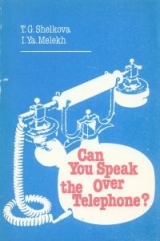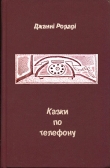
Текст книги "Как вести беседу по телефону"
Автор книги: Т. Шелкова
Соавторы: И. Мелех
Жанр:
Языкознание
сообщить о нарушении
Текущая страница: 4 (всего у книги 6 страниц)
E. CONGRATULATIONS
1. Congratulations on a Promotion
Mr James: Two-four-five; seven-double three-six.
Mr Serov: Good morning. Could I have a word with Mr James, please?
Mr James: Speaking.
Mr Serov: Boris Serov here, Arthur.
Mr James: Oh, hello, Boris.
Mr Serov: I’m calling to offer you my heartiest congratulations on your promotion.
Mr James: Thank you ever so much.
Mr Serov: I guess you have other fish to fry[12]12
to have other fish to fry иметь другие более важные дела
[Закрыть] and we won’t be having as many official contacts now, but I do hope that our productive cooperation will continue.
Mr James: I hope so, too. It has always been a great pleasure for me to have worked with the people from your country.
Mr Serov: Thank you. That’s splendid then. Please accept my best wishes for your future career. Good-bye, Arthur.
Mr James: Good-bye, Boris.
2. Happy Birthday
Mr Clay: Hello. Could I speak to Mr Orlov?
Mr Orlov: Speaking. Good afternoon.
Mr Clay: Good afternoon, Mike. This is John Clay speaking.
Mr Orlov: How are you, John?
Mr Clay: Fine, thanks. I called to wish you a happy birthday.
Mr Orlov: Thank you very much, John. It’s so kind of you to remember my birthday. Incidentally could you come over to my place tonight? I’m having a few people over.
Mr Clay: Thanks, Mike, but I’m afraid I must be leaving for Glasgow today. I’ll give you a ring when I come back.
Mr Orlov: Good. So I hope to see you before long. Good-bye.
Mr Clay: Good-bye.
3. Congratulations on a Marriage
Mr Candlin: Three-four-one; seven-one-double eight.
Mr Azarov: Hello, Philip, Azarov here.
Mr Candlin: Oh, Victor, good morning.
Mr Azarov: I was delighted to hear of your marriage, Philip. Please accept my most sincere and hearty congratulations. I wish I could have been at your wedding but I have only just come from Moscow.
Mr Candlin: Thank you very much. I was so sorry you couldn’t come.
Mr Azarov: It’s really good that you decided to get married at last and I do wish you and Mary the very best of luck and many years in which to enjoy it.
Mr Candlin: Thank you for your kind wishes.
Mr Azarov: Good-bye.
Mr Candlin: Bye.
4. Congratulations on Birth of Son
Mr Petrov: Good afternoon, Jack.
Mr Hailey: Good afternoon, Nick.
Mr Petrov: Congratulations on the arrival of your son. My wife and I were delighted to hear the good news and especially to know that Jenny and your son are both well.
Mr Hailey: Thank you very much, Nick. You can’t imagine how happy I am.
Mr Petrov: You are sure to make a wonderful father, but don’t get too excited about it.
Mr Hailey: I can’t help it. I’m brimming over with joy and happiness[13]13
I’m brimming over with joy and happiness. Я преисполнен радости и счастья.
[Закрыть]. You know how it feels to become a father.
Mr Petrov: Congratulations again, and please give them to Jenny when you see her, from both of us. Good-bye.
Mr Hailey: Thanks, Nick. Bye.
EXERCISES
I. Read the dialogues and reproduce them paying attention to telephone phrases.
II. What would you say on the phone in reply to these remarks and questions?
1. I’m happy to offer you my hearty congratulations on your promotion. 2. You can’t imagine how happy I am. My wife has borne me a son. 3. I’m so sorry you couldn’t come to our wedding. 4. Many happy returns of the day, Nick. 5. My wife has been seriously ill. But now she is out of danger. She managed to pull through her illness. 6. I’m calling to convey our congratulations on your successful completion of the project. 7. Accept my best wishes for your future career.
III. In what situations would you say the following?
1. You have other fish to fry. 2. I hope that our productive cooperation will continue. 3. Please accept my best wishes. 4. It’s so considerate of you to send me your congratulations. 5. I am sure you’ll make a wonderful father. 6. He’s brimming over with joy and happiness. 7. Convey my hearty congratulations to your wife. 8. I’m delighted to hear that your wife and new-born baby are well.
IV. Convey congratulations by phone:
1. to your colleague who has been promoted; 2. to your counterpart who has got married; 3. to the director of the company on the successful completion of the project; the equipment for the project has been delivered by this company; 4. to your American friend who has become a father; 5. to your African colleagues on their National Holiday.
F. EXCHANGE OF OPINIONS
1. Discussing Business
Mr Ross: Could I speak to Mr Frolov, please?
Mr Frolov: Speaking.
Mr Ross: Good morning, Mr Frolov. This is Ross. I work with the U.N. in the Development Programme[14]14
the Development Programme Программа развития (экономики)
[Закрыть].
Mr Frolov: That is my field, too.
Mr Ross: That’s why I am calling you, Mr Frolov.
Mr Frolov: Is there anything I can do for you?
Mr Ross: I read your articles on technical assistance and find them excellent.
Mr Frolov: They may seem a little obsolete, I am afraid. I wrote them some years ago.
Mr Ross: Well, the figures may be obsolete, but the general approach and the method of research are up-to-date. What is most interesting is the analysis of the economy you gave in your last article.
Mr Frolov: That is the article on the economic development of some East African countries, isn’t it? Are you an economist, Mr Ross?
Mr Ross: Yes, I am. My field is the influence of the U.N. technical assistance[15]15
the U.N. technical assistance техническая помощь, оказываемая ООН
[Закрыть] upon the economic development of East African countries.
Mr Frolov: That is a very interesting but little known field. In what way, Mr Ross, do you think, I can help you?
Mr Ross: Mr Frolov, you are a specialist on the economic situation in Eastern Africa. Could you recommend me any literature on the subject?
Mr Frolov: Certainly, I can send you the bibliography on the problem.
Mr Ross: Will you send it to my U.N. address, please?
Mr Frolov: I will. Good-bye, Mr Ross.
Mr Ross: Thank you very much. Good-bye.
2. Discussing Arrangements
Mr Brenn: Could I speak to Mr Shilov, please?
Secretary: Who’s calling, please?
Mr Brenn: This is Tom Brenn of the Conference Department, United Nations.
Secretary: Wait a second, Mr Brenn. Here is Mr Shilov.
Mr Shilov: Hello, Mr Brenn. Has the Conference finished its work? I’m sorry I had to leave due to an urgent matter here in the Mission.
Mr Brenn: That’s all right, Mr Shilov. The Conference has adjourned till next Tuesday. The Chairman has asked you and me to prepare a draft resolution.
Mr Shilov: Has anyone else been included in the draft resolution group?
Mr Brenn: Only two of us, and a secretary.
Mr Shilov: I must say Mr Ovenov is an excellent chairman. I like the way he conducted the proceedings. He gave everyone a chance to speak and kept the discussion to the point.
Mr Brenn: It’s a pity you left. At the end he gave a very good summary of the first day’s work of the Conference.
Mr Shilov: I hope that all the participants of the Conference will make an effective contribution to the subject under consideration. See you tomorrow then.
Mr Brenn: Yes, 10 o’clock in the morning, at the Conference Hall. Goodbye, Mr Shilov.
Mr Shilov: Good-bye, Mr Brenn.
* * *
Mr Reid: Hello, can I speak to Mr Petrov, please?
Secretary: Who’s calling, please?
Mr Reid: This is Reid of the Foreign Office.
Secretary: Which Petrov would you like to talk to, Mr Reid? We have two Petrovs here – councillor Arcady Petrov and attache Leonid Petrov.
Mr Reid: Councillor Petrov, please.
Secretary: Mr Petrov is on the phone.
Mr Petrov: Hello, Mr Reid. I am glad you called me.
Mr Reid: How are you, Mr Petrov? I hope you are not too busy with the preparations for this forthcoming conference of ours?
Mr Petrov: I am fine, thank you. I have an appointment with you, you remember, to discuss the draft resolution of the conference.
Mr Reid: Of course, I do. It is this Friday, at 3 p.m. Did the Chairman of the Committee send you the draft?
Mr Petrov: Yes, he did, and his personal letter, too. He’s insisting on discussing the draft resolution by a narrow circle of diplomats first. I don’t know what he means mentioning “a narrow circle of diplomats”.
Mr Reid: Our delegation also received his personal letter, and, as a matter of fact, it surprised us a little. I wish he would tell us more explicitly what this “narrow circle of diplomats” will be dealing with.
Mr Petrov: You don’t mind, Mr Reid, if we discuss this problem along with the other questions this Friday, do you?
Mr Reid: No, I don’t. I’m looking forward to seeing you soon. Good-bye.
Mr Petrov: Good-bye, Mr Reid.
3. Going on Business Abroad
Mr Jones: Hello, Mr Sedov. What have you been up to since I saw you last?
Mr Sedov: Not much, I am afraid, Mr Jones. Just the usual routine work here in the Department of Technical Assistance. And how are you?
Mr Jones: I’m fine, thank you. I’ve heard from Sergeev that you are going to leave for Yugoslavia soon. Is that right?
Mr Sedov: Yes, it is. A group of engineers and technical advisers from the Department is supposed to visit that country.
Mr Jones: On any particular mission?
Mr Sedov: Yes, the Yugoslavs invited us to help them with the construction of modern highways.
Mr Jones: Then they may be in need of the great cranes and bulldozers our firm is producing.
Mr Sedov: Most probably. You should get in touch with the Assistant Director of the Department, and ask him for information and advice, Mr Jones.
Mr Jones: What’s his name?
Mr Sedov: Mr Souram of India.
Mr Jones: Do you have his telephone number?
Mr Sedov: Jot it down – 377-01-09.
Mr Jones: Thank you. When are you leaving for Yugoslavia?
Mr Sedov: Next Monday. You’d better get in touch with Mr Souram as soon as possible
4. Talking of Colleagues
Fred: Hello, Yuri. This is Fred.
Yuri: Hello, Fred. How are you?
Fred: Very busy. We’ve got a lot of work here with the documents.
Yuri: I know. It’s the usual thing with the Documents Office before the Assembly.
Fred: Do you know the news?
Yuri: No, what is it?
Fred: Can you imagine – Dorothy and John are engaged.
Yuri: Which John? The one working in the Conference Department?
Fred: That’s right. And Dorothy is with the Technical Assistance Department.
Yuri: When was the engagement announced?
Fred: A week ago.
Yuri: Have they set the day for the wedding?
Fred: No, not yet. But John says they will marry sometime in November or December. He says you’re on the guest list.
Yuri: Am I? Then I’ve got to think about a wedding present.
Fred: It’s too early yet. He will send you an invitation to the wedding party.
Yuri: And who is the best man?
Fred: Their choice fell on me because I’m a bachelor.
Yuri: Congratulations! They could not have chosen a better man. You are witty, bright and will keep them free from the little worries which usually crop up at the ceremony.
Fred: I’ll try to do my best; as the best man should do. See you at the office on Monday. Bye-bye.
Yuri: Bye-bye, Fred.
5. Talking of Studies
Fred: Hello, Yuri. This is Fred.
Yuri: Hello, Freddy, how are you?
Fred: Not very well, I’m afraid.
Yuri: What’s the matter? Somebody’s ill?
Fred: No, everybody’s fine. But I’m giving up. I certainly can’t learn Russian.
Yuri: Why are you upset? I think you’re making wonderful progress.
Fred: No, I’m not. I try and try but still cannot speak it well.
Yuri: Well, learning any language takes a lot of effort and time. But don’t give up. What if I help you? I have a very good textbook only recently brought from Moscow.
Fred: Thank you, Yuri. I’m sure your help will improve things.
Yuri: See you on Monday, Freddy. Good-bye.
Fred: Thanks again, Yuri. Good-bye.
6. Talking of Sports
Mr Serov: Mr Budd? Good afternoon. This is Serov speaking.
Mr Budd: Hello, Mr Serov. Nice to hear you. How’s everything?
Mr Serov: Fine, thank you. You know, this Friday our Dynamo team is playing against your Red Sox.
Mr Budd: Are they really? That’s great! They are my favourite teams and I don’t know who to root for.
Mr Serov: I have two tickets. Would you like to watch the match?
Mr Budd: Sure thing. This is the only chance, and I would not miss it. And what’s your favourite sport?
Mr Serov: It’s hard to say. I like soccer all right, but I think I like tennis better.
Mr Budd: Do you play much tennis?
Mr SeroV: Yes, quite a bit. How about a game sometime?
Mr Budd: No, thanks. I am strictly a spectator.
Mr Serov: So I’m sending you the tickets for the match and hope to see you on Tuesday.
Mr Budd: Thank you, Mr Serov. I’m looking forward to seeing you. Goodbye.
Mr Serov: Good-bye.
EXERCISES
I. Read these dialogues and reproduce them as close to the text as possible.
II. What would you say on the phone in reply to these remarks or questions?
1. I suppose, that if we weigh the “pros” and “cons” we can make a more equitable assessment of the proposal. 2. Mr Orlov, I think, made a pertinent remark during the debate. 3. If you take an overall view of things I’m sure you’ll change your opinion. 4. I like the way Peter conducted the proceedings. He kept all the discussion to the point. 5. I wouldn’t say that the speaker explicitly spelled out what he had in mind. 6. Mr Breddy is away from the office on sick leave. Is there any message? 7. I think he is making wonderful progress in English. 8. Your argument turned the scale in my favour in our dispute. 9. Why do you think, Mr Omar, the staff at your office is in constant state of flux?
III. In what situations would you say the following?
1. I don’t know which team to root for. 2. Their choice fell on me because I’m a bachelor. 3. Could you fix an alternative date for meeting? 4. I’ll leave the invitation as an open one until a little later. 5. We are anxious to make whatever arrangements are convenient to you for spending a day or two in visiting our factory. 6. Then I’ve got to think about a present. 7. This is the only outstanding question. It should be brought up again tomorrow. 8. This is a very persuasive argument. You should have mentioned it. 9. I’m terribly sorry. I can’t disturb him. He is in conference.
IV. Discuss over the phone with a friend of yours:
1. the film you have seen; 2. the book you have read; 3. the performance you have seen; 4. the conference you have attended; 5. the holiday you had in summer; 6. the invitation to a wedding party you have received; 7. your favourite sport; 8. the party you have been to.
Working in groups of two, read the two dialogues aloud.
Dialogue 1
Discussing the Ties Between the Congress and the State Department
After having an interesting tour around the Capitol, this seat of US legislation, a tourist group of foreign students surrounded their American guide, who is a member of the House Foreign Affairs Committee. They poured a forest of questions upon him.
Tourist A: We are foreigners, Sir, and do not know much either about the Congress or the State Department. Do you mind if we ask you some questions?
Guide: Of course not. Go ahead. What is it that you’d like to know?
Tourist B: Does the Congress take part in US foreign policy formulation?
Guide: Very much so. The US participation in world affairs since World War II has greatly expanded the role of the Congress in foreign policymaking.
Tourist C: We thought that this was the competence of the State Department.
Guide: This is what the foreigners usually think. The President is the central figure of American foreign policy, and the final responsibility is his.
Tourist D: And the State Secretary’s?
Guide: While the President makes the most critical decisions, he cannot possibly attend to all matters affecting international relations. The Secretary of State, the first-ranking member of the Cabinet, is at the same time the President’s principal adviser in formulating foreign policy.
Tourist A: What are the problems requiring the attention of the Secretary?
Guide: They are manifold – from maintaining country’s security to rescuing an individual American who got in serious trouble in some remoted area of the world.
Dialogue 2 (Continuation)
Tourist B: And where does the Congress come into picture?
Guide: To begin with, none of this country’s far-reaching, programs – participation in the United Nations, economic, technical and military assistance – would have been possible without congressional action.
Tourist C: The annual appropriations of funds for enormous military build up, I presume, need congressional approval, too?
Guide: Absolutely so, but only on the recommendations of the Armed Services and Appropriations Committees of both Houses.
Tourist D: Who are the members of numerous House and Senate Committees?
Guide: They are usually experienced and authoritative members of Congress with long service. Their inspections abroad and participation in US delegations to the UN General Assembly and to many other international conferences give them firsthand experience with US foreign problems.
Tourist A: Who informs the members of Congress on the current foreign policy issues?
Guide: The Secretary of State does. He meets regularly with the members of Senate and House Committees and brief s them on a broad range of foreign policy matters. They are kept well-informed of the international developments affecting this country.
Tourist B: Does the State Department provide these bodies with comprehensive reports on US foreign policy?
Guide: To further facilitate the relationship with the Congress, the Secretary of State annually provides the Committees with a comprehensive report on US Foreign Policy.
Tourist D: Any other channels of communication with the Congress?
Guide: Yes, a constant and substantial interchange of views between the members of the Congress and the Department goes on through the Assistant Secretary for Congressional Relations.
Tourist D: Very well, Sir. On behalf of the foreign students I should like to thank you for a very interesting and detailed talk on the congressional participation in foreign policymaking.
WORDS AND WORD COMBINATIONS YOU MAY NEED
a critical decision решение по важному, не терпящему отлагательств вопросу
to attend to matters уделять внимание вопросам
the first-ranking member of the Cabinet член кабинета, занимающий наиболее высокое положение
manifoldа многочисленный, разнообразный
rescuev спасать, оказывать помощь
annual appropriations годовые ассигнования
military build up наращивание военных сил
numerousa многочисленный
firsthand experience личный опыт
G. MISCELLANEA
1. Dealing with Complaint
Mr Stogov: Hello, is that Parson’s Garage?
Telephone Voice: Yes, this is Fred Parson.
Mr Stogov: Good. This is Stogov. What I wanted to say, was that I can’t quite understand why you have sent me another bill for ₤25, considering that I’ve paid this bill already. I think it was at least four weeks ago.
Telephone Voice: Oh, sorry about that. You see, we’ve got a new girl in the office and she hasn’t quite got the hang of things yet. Just ignore it, will you? Sorry to have caused you this inconvenience. It won’t happen again, – at least, I hope not.
Mr Stogov: So do I. Good afternoon.
2. Thank You Talk
Mr Saveliev: Could I speak to Mr Abbott, please?
Mr Abbott: Speaking.
Mr Saveliev: Good morning, Mr Abbott. This is Saveliev.
Mr Abbott: Good morning, Mr Saveliev. I am glad to hear from you. How are you?
Mr Saveliev: Fine, and you, Jack?
Mr Abbott: I am fine, too.
Mr Saveliev: Thank you for the birthday card and the champagne. The card gave me as much pleasure as the wine.
Mr Abbott: How was it, good?
Mr Saveliev: It’s the best champagne I have ever had. You certainly hit the spot[16]16
to hit the spotAm. попасть в точку, угодить
[Закрыть] with your gift. We missed both of you at the birthday party.
Mr Abbott: It’s a pity Alice and I could not come. But you know the reason.
Mr Saveliev: Yes, I do. We drank to your health. I hope you’ll come to my wife’s birthday party this spring.
Mr Abbott: Of course, we’ll be happy to. Best regards to Irene.
Mr Saveliev: Thank you. Say hello to Alice, please.
Mr Abbott: I will, good-bye.
Mr Saveliev: Good-bye.
3. Asking After Health
Mr Butov: Hello. May I speak to Mr Frost, please?
Secretary: Just a moment. Mr Frost, it’s for you.
Mr Frost: Hello, who’s speaking?
Mr Butov: This is Mr Butov.
Mr Frost: Good afternoon, Mr Butov. I haven’t heard from you since October.
Mr Butov: I had the flu for a couple of weeks, but I’m fine now.
Mr Frost: I’m glad to hear that. We did have a spell of bad weather.
Mr Butov: By the way, did you hear what happened to Fred Jackson?
Mr Frost: No, what about him?
Mr Butov: He has had such a bad case in the flu that they’ve taken him to the hospital.
Mr Frost: I am sorry to hear that. Poor fellow, he won’t be able to attend the session of the Assembly, then.
Mr Butov: I’m afraid not. And what about you, Mr Frost? Will you be present at the session?
Mr Frost: Unless I get ill.
Mr Butov: I hope you won’t. See you on Tuesday. Good-bye.
Mr Frost: Good-bye, Mr Butov.
4. Ordering Foodstuffs
Operator: Hello. Supermarket. Can I help you?
Mr Petrov: Hello. This is Petrov speaking. I’d like you to send me some things, please.
Operator: I’ll put you through to the Deliveries Department.
Mr Petrov: Thank you.
Deliveries Department: Good morning. Deliveries.
Mr Petrov: I’d like some things sent this morning, please.
D.D.: I’m afraid we can’t manage anything this morning. One of the van men hasn’t reported for work today. I’ll do my best to arrange it for this afternoon. May I have your name, please?
Mr Petrov: Mr Petrov. 14, Hereford Drive.
D.D.: Thank you. What would you like?
Mr Petrov: Eight pounds of potatoes to start with; a large sliced loaf; a medium-sized cauliflower; a pound of beef sausages; half a pound of minced beef; a large bag of self-raising flour; half a dozen large eggs. That’s all.
D.D.: I’m not sure whether we keep beef sausages. Excuse me a moment. I’ll just check that. (He goes off to check and then comes back.) Hello. No, I’m sorry. We’ve got pork sausages.
Mr Petrov: I’ll try that then. By the way, you forgot to send the invoice with my last order. Send it this time, will you? I’d like to settle my account as I’m going on holiday next week. Could I have a statement of what I owe?
D.D.: Yes, sir. I’ll inform the accounts section and they’ll fit in your order this afternoon and send you the statement.
Mr Petrov: Thank you. Good-bye.
D.D.: Good-bye.
5. Flight Delays
Mr Blake: Good afternoon, Mr Vasiljev. This is Blake from the Protocol Department.
Mr Vasiljev: Good afternoon, Mr Blake.
Mr Blake: I’d like to bring to your attention that Flight 903 by which the Polish Delegation led by the Minister of Foreign Trade and Shipping is due to get to London is delayed. We’ve just had a message that owing to a dense fog all aircraft bound for London has been diverted to Amsterdam.
Mr Vasiljev: Thank you very much for letting us know. I wonder if you would be so kind as to give us a ring when you are sure of the time the plane will be arriving.
Mr Blake: Yes, don’t you worry. I’ll certainly do that. Good-bye.
Mr Vasiljev: Good-bye.
6. Making a Call from a Call-box
A gentleman enters a telephone call-box in a hurry, takes off the receiver and dials the number of trunk-call service at the exchange.
Operator: Trunk service. Number, please?
G.: Victoria 2904. I say, operator, will you hurry it up for me as I have to catch a train in a few minutes.
O.: Unless your number is engaged, I can put you through almost at once. Drop your coin, please, and press button A as soon as your number answers.
(The gentleman drops a coin and presently hears a high-pitched sound at the other end, the engaged signal.)
O.: I’m sorry, sir, your number is engaged. Will you press button В to get your money back? I suggest you try again in a minute or two.
G.: All right.
(After a while he rings the exchange once more.)
O.: Trunk service.
G: Will you try Victoria 2904 once more for me, please?
O.: Drop your coin, please. I have got your number! Hold the line, please.
G. (hears a voice): Are you there?
Voice (at the other end): This is Mr Jones’ house, 24 Strethem Road.
G: Oh, it’s you, Mary. Will you fetch Mrs Jones as quickly as you can.
Mrs Jones: Is that you, George, dear? How are you? So happy to hear your voice again! When will you be home again?
G.: I can’t hear you, dear. Your voice is ever so faint. There’s some background noise interfering.
O.: Can you hear your number all right?
G: No, I cannot, operator. Will you try and clear the line for me, please?
O.: Hold a minute, please. I think that’s better now.
G.: Are you there? Is that you, Lucy, dear? I say, can you hear me?
Mrs Jones: Yes, dear, I can.
G.: I’m arriving at Victoria at 5.40 this afternoon. Will you come to meet me there?
Mrs Jones: Certainly, dear.
O.: Your time is up. If you want to speak on drop another six-pence, please.
G: All right, dear, so long.
EXERCISES
I. Read these dialogues and reproduce them as close to the text as possible.
II. What would you say on the phone in reply to these remarks or questions?
1. Nick had a bad case in the flu and he was taken to the hospital. 2. The train from Liverpool is delayed. 3. Your number doesn’t answer. 4. I am having my birthday party next Saturday. I wonder if you and your wife would care to come. 5. Would you like to make a personal call or a station-to-station call? 6. There is no direct service between Washington and Madison, but let me see what the best connecting point is. 7. We would like you to confirm your reservation in writing. 8. I’m calling you to inquire about books by Soviet contemporary writers. Where can I get them? 9. Then could you manage to come over on Monday at eleven o’clock? 10. I was delighted to hear of your promotion. Congratulations!
III. In what situations would you say the following?
1. Sorry to have caused you this inconvenience. 2. Say hello to your wife, please. 3. I’m afraid he won’t be able to attend the conference. 4. I wonder if Flight 753 is due to get to London on schedule. 5. The aircraft bound for Moscow has been diverted to Amsterdam. 6. I wonder if you would be so kind as to give me a ring when you come to know the date of his departure. 7. I’m pretty sure we’re free on Sunday but I’ll have to check with my wife. 8. My call is really urgent. 9. No, thank you. I’ll call back later. 10. How long will it take to have my suit pressed? 11. Could you tell me when you have flights from here to Moscow? 12. You hit the spot with your gift.
IV. Make calls according to these assignments:
1. You had your TV set repaired. But it does not work well. Report your complaint to the TV repair shop. 2. Thank your friends who sent you a birthday card and a gift. 3. Your colleague has been taken ill. Ask after his health. 4. Ask the Deliveries Department to send you foodstuffs. 5. The delegation which was due to be in London on Monday is delayed. Call off the meeting with the President of the Steel Corporation.
Read the dialogues aloud working in groups of two.








